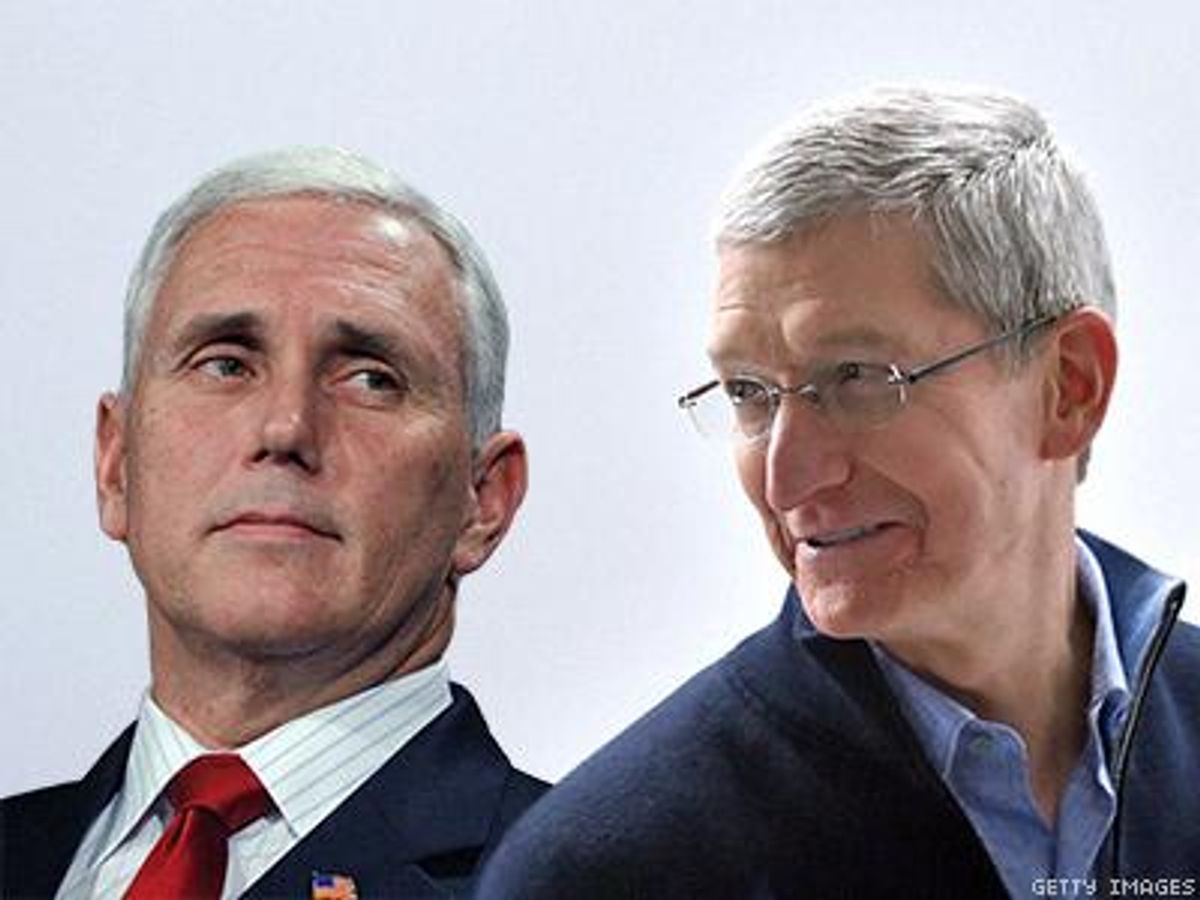Economically, the state of Indiana has a surprising number of similarities to Apple Inc. The Hoosier State's annual gross output is actually greater than the iconic tech firm's annual sales: $294 billion for Indiana, $199 billion for the iPhone maker. But the leaders of these two large enterprises couldn't be more different in the way they see America.
Although Apple Inc.'s annual revenues compare well to the entire gross domestic product of a heartland state with 7 million residents, the company's corporate culture and social ethics look a lot more like American attitudes toward LGBT equality and religious freedom circa 2015 than the ideology espoused by the Midwestern state's top politicians.
In a March 29 Washington Post op-ed, Apple CEO Tim Cook, who came out last year, warned that the Religious Freedom Restoration Act that passed in Indiana and laws like it "go against the very principles our nation was founded on, and they have the potential to undo decades of progress toward greater equality." Cook continued with a full-throated endorsement of religion and faith, saying that he has "great reverence for religious freedom," adding that as a child, he "was baptized in a Baptist church, and faith has always been an important part of my life. I was never taught, nor do I believe, that religion should be used as an excuse to discriminate."
Indiana Gov. Mike Pence, as he scrambled to allow his state's homophobes to have their discrimination-filled cake and eat it too, claimed to "abhor discrimination," saying, "No one should be harassed because of who they are, who they love, or what they believe. I believe it with all my heart." But his record shows a long list of stances against LGBT rights. As a congressman before he was governor, he opposed marriage equality, the Employment Non-Discrimination Act, LGBT-inclusive hate-crimes legislation, and military service by gay, lesbian, and bisexual people.
Take this declaration from his 2000 congressional campaign: "Homosexuality is incompatible with military service because the presence of homosexuals in the ranks weakens unit cohesion." It only took a year after the repeal of "don't ask, don't tell" for the studies to start rolling in proving just the opposite to be true.
A cold, hard look at the cost of discrimination from a strictly business perspective -- once thought of as the purview of Republicans like Mike Pence -- illustrates how CEOs such as Tim Cook have a lot more in common with a traditional, no-nonsense American approach to economics. According to the Center for American Progress, a left-leaning, pro-labor think tank, the political fallout from the the RFRA affair could cost Indiana's economy upward of $250 million. (Now the law has been ostensibly fixed to prevent it being used to discriminate, but some business and political leaders think more needs to be done to protect LGBT people in Indiana; the state's antidiscrimination law does not cover them.)
"In just the past few days, Indiana's license to discriminate against LGBT Americans has already put one-quarter of a billion dollars at risk for the state's economy," said Laura E. Durso, director of CAP's LGBT Research and Communications Project, in a statement to the media. "And that number will only climb as long as state officials insist on disingenuously using religious freedom as a ruse to discriminate against LGBT Americans. A broad coalition of businesses, faith communities, and organizations have taken a stand against this law. It is time for officials in Indiana and the roughly 30 other states where LGBT discrimination is legal to take notice. You cannot be pro-business and pro-discrimination at the same time."
Last year the center released a study titled "We The People: Why Congress and U.S. States Must Pass Comprehensive LGBT Nondiscrimination Protections," which detailed seven major congressional steps that would do much to end discriminatory evictions, firings, and failures to hire based solely on gender identity, gender expression, or sexual orientation. As CAP notes, at the moment, those practices remain completely legal in at least 31 states.
A 2012 study by the same think tank, titled "The Costly Business of Discrimination," found that 42 percent of gay workers had experienced discrimination, while an astonishing 90 percent of transgender workers had been the victims of workplace discrimination. Meanwhile, says CAP, the cost to American industry in terms of lost output directly caused by discrimination against LGBT employees is $1.4 billion.
"America's business community recognized a long time ago that discrimination, in all its forms, is bad for business," Cook wrote in The Washington Post. "At Apple, we are in business to empower and enrich our customers' lives. We strive to do business in a way that is just and fair."
Justness and fairness are two values that all Americans share. Invoking them while claiming the substance of longstanding company policy as Cook did in his Washington Post op-ed struck a persuasive chord with the American psyche.
"That's why, on behalf of Apple," the CEO continued. "I'm standing up to oppose this new wave of legislation -- wherever it emerges. I'm writing in the hopes that many more will join this movement. From North Carolina to Nevada, these bills under consideration truly will hurt jobs, growth and the economic vibrancy of parts of the country where a 21st-century economy was once welcomed with open arms."
The dust from Indiana's Religious Freedom Restoration Act debacle is still settling. But it's already clear that Apple CEO Tim Cook has more in common with and perhaps more influence on American attitudes about equality and religious freedom than Mike Pence.
THOM SENZEE is an Advocate contributor and freelance writer. Follow him on Twitter at @Tsenzee.


















































































